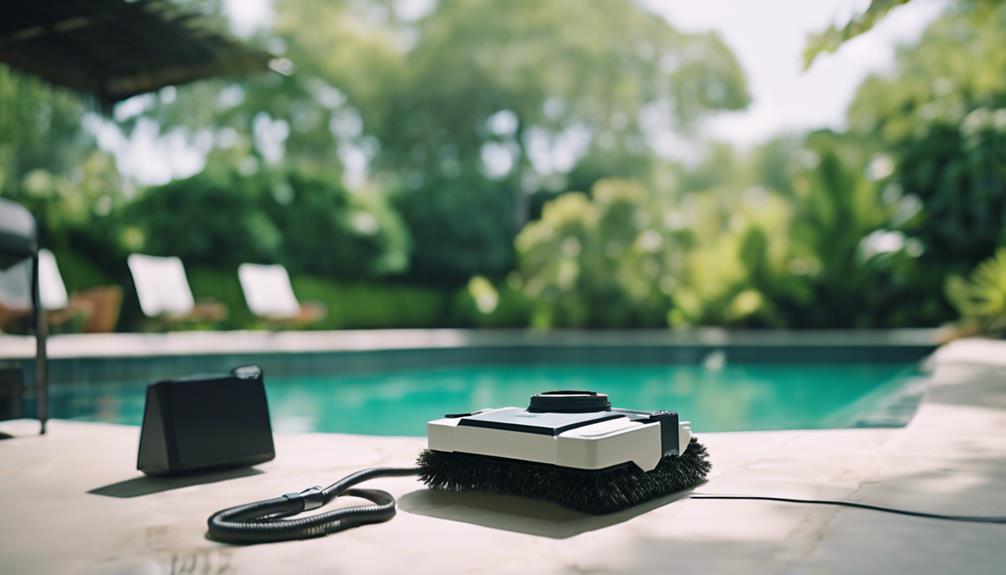Saltwater pools are a great option for those looking for an eco-friendly and skin-friendly pool choice. Despite higher initial installation costs, the long-term benefits outweigh this investment. These pools boast lower maintenance costs due to decreased corrosiveness, offering a cost-effective and hassle-free experience for owners. Regular cleaning and proper maintenance, including monitoring salt levels and adjusting pH, are essential. The reduced chlorine levels are gentle on skin, making it suitable for individuals with skin conditions. Keep in mind that saltwater pools still contain chlorine and require specific maintenance procedures for best performance and enjoyment.
Key Takeaways
- Saltwater pools are eco-friendly, ideal for sensitive skin.
- Initial installation costs may be higher but offer long-term savings.
- Lower maintenance costs due to reduced corrosiveness.
- Regular cleaning and monitoring ensure optimal performance.
- Health benefits include gentler chlorine levels and reduced skin irritations.
Benefits of Saltwater Pools
Saltwater pools offer a range of advantages that make them a popular choice for pool owners seeking a more environmentally friendly, cost-effective, and skin-friendly swimming experience. These pools utilize a salt chlorination system, resulting in lower chlorine concentrations and reduced need for frequent draining.
The decreased reliance on traditional chlorine products makes saltwater pools more eco-friendly, with less water wastage. Additionally, the absence of additive chemicals not only reduces operating costs but also provides a milder swimming experience that is suitable for individuals with sensitive skin or allergies.
Cost Analysis of Saltwater Pools
Analyzing the costs associated with implementing a saltwater pool system reveals significant advantages over traditional chlorine pools regarding long-term savings and maintenance efficiency.
While the initial installation of a salt chlorinator system may incur higher costs compared to traditional chlorine pools, the long-term benefits often outweigh this initial investment.
Maintenance costs are lower due to the reduced corrosiveness of saltwater pools, resulting in fewer repairs and replacements of pool equipment.
Moreover, there are no additional fees or unexpected charges once the system is installed, making it a cost-effective and hassle-free option for pool owners.
Ultimately, the cost-effectiveness of saltwater pools makes them a worthwhile long-term investment and a viable alternative to traditional chlorine pools.
Maintenance Tips for Saltwater Pools

Efficient maintenance of a saltwater pool involves implementing practical strategies to achieve peak performance and longevity of the pool system. To guarantee optimal functionality, regular cleaning of the pool's walls and floor is essential to prevent algae growth and maintain water clarity.
Monitoring the salt levels is essential, as insufficient salt can lead to system malfunctions, while excess salt can cause corrosion. Additionally, checking and adjusting the pH levels regularly helps prevent equipment damage and ensures bather comfort.
Inspecting and cleaning the salt cell periodically to remove mineral build-up is necessary to maintain the chlorine production process. Finally, following manufacturer guidelines for maintenance tasks and scheduling professional inspections can help address any potential issues promptly.
Health Considerations With Saltwater Pools
Consideration of health implications in relation to saltwater pools is crucial for understanding the potential benefits and drawbacks associated with their usage.
Saltwater pools offer lower chlorine levels, making them gentler on sensitive skin and allergies compared to traditional chlorine pools. The reduced chemical exposure can be advantageous for individuals with skin conditions like eczema and can contribute to a more relaxing swimming experience.
Additionally, the lower chlorine concentrations in saltwater pools may help reduce stress and promote a healthier environment for swimmers.
However, it is important to note that saltwater pools still contain chlorine, although at lower levels, and may require specific maintenance procedures to ensure ideal health benefits for users.
Debunking Saltwater Pool Myths

Dispelling common misconceptions surrounding saltwater pools is crucial for understanding their benefits and maintenance requirements.
Contrary to popular belief, saltwater pools are not entirely chlorine-free. While they do use a salt chlorination system to generate chlorine, the levels are notably lower than in traditional chlorine pools.
Another common myth is that saltwater pools do not require any maintenance. In reality, these pools still need regular monitoring of salt levels and pH balance to ensure proper functioning.
It is also important to note that the initial installation cost may be higher due to specific equipment requirements. However, when properly sized and maintained, saltwater pools offer a cost-effective and eco-friendly alternative to traditional chlorine pools, with numerous health benefits for swimmers.
Frequently Asked Questions
Do Saltwater Pools Taste Salty Like the Ocean?
Saltwater pools do not taste salty like the ocean. The salt content is minimal and not noticeable to swimmers. The primary purpose of salt in these pools is for the generation of chlorine, providing a milder and more pleasant swimming experience.
Can I Convert My Existing Pool Into a Saltwater Pool?
Dreaming of a saltwater oasis? Converting your existing pool to saltwater is possible. Invest in a salt chlorinator system for a smooth changeover. Enjoy the benefits of lower chlorine levels, reduced maintenance, and a gentler swimming experience.
Will a Saltwater Pool Damage My Hair or Swimsuits?
Saltwater pools are unlikely to damage hair or swimsuits. The lower chlorine levels in saltwater pools are gentler on fabrics and hair compared to traditional pools, making them a suitable option for swimmers concerned about potential damage.
Do Saltwater Pools Attract More Bugs or Pests?
Saltwater pools do not inherently attract more bugs or pests compared to traditional chlorine pools. Proper maintenance and cleanliness practices are key in preventing any potential pest issues, ensuring a pleasant and bug-free swimming experience.
Are Saltwater Pools Safe for Children and Pets to Swim In?
Saltwater pools are safe for children and pets to swim in. With lower chlorine levels, they are gentler on skin and eyes. Properly maintained salt levels guarantee safety. Anticipated objection: Initial installation costs may deter some, but long-term benefits outweigh the investment.
Conclusion
To wrap up, saltwater pools offer numerous benefits, such as lower chlorine concentrations, reduced water usage, and cost-effective maintenance. Despite initial installation costs, the long-term savings and health benefits make them a compelling choice for many pool owners.
Notably, a study by the Water Quality and Health Council found that saltwater pools can reduce eye irritation by up to 50% compared to traditional chlorine pools, highlighting the potential advantages of this alternative swimming option.










